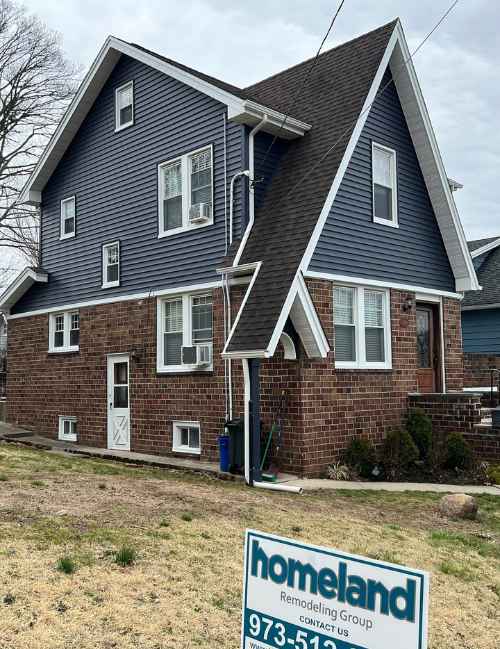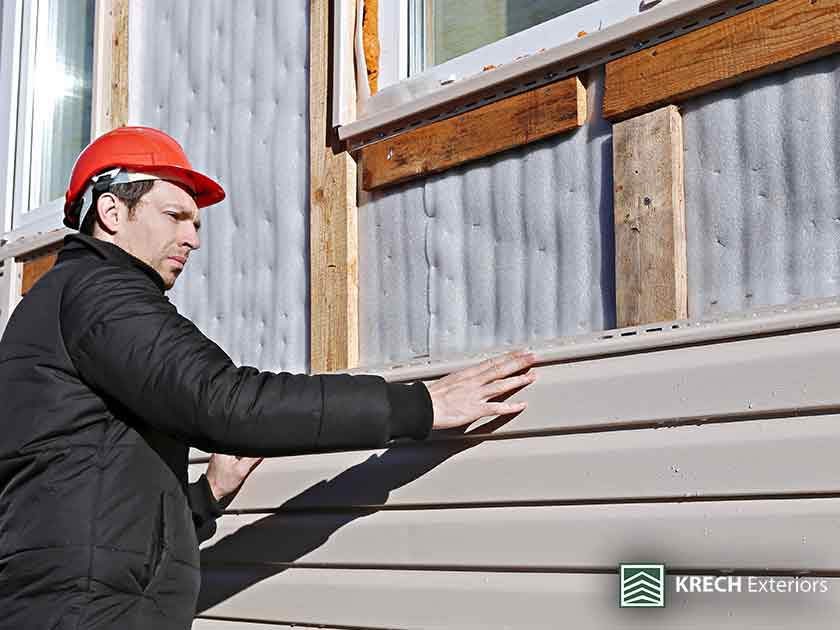Morris Siding Contractor with Exceptional Service and Top-Notch Materials
Morris Siding Contractor with Exceptional Service and Top-Notch Materials
Blog Article
The Essential Overview to the Different Kinds Of Home Siding and Their Unique Advantages
In the world of home renovation, picking the appropriate siding is a vital decision that impacts both aesthetic appeal and functional efficiency. With so several alternatives to take into consideration, which siding product genuinely stands out for your certain job?
Wood Home Siding
Timber home siding, a prominent option for domestic exteriors, supplies an ageless aesthetic that combines all-natural appeal with structural honesty. This house siding material is offered in various designs, including clapboard, shingles, and board-and-batten, permitting home owners to tailor their appearance to match their layout choices. Timber exterior siding is generally crafted from durable varieties such as cedar, redwood, or yearn, which are recognized for their strength and capacity to endure ecological stressors.
Among the main benefits of wood siding is its excellent insulation residential or commercial properties, which can add to energy performance and lower home heating costs. In addition, wood home siding is biodegradable, making it an eco-friendly choice when sourced sustainably. Normal maintenance, consisting of paint or discoloration, can prolong its life expectancy and improve its appearance, permitting property owners to maintain the natural appeal of the timber.
However, potential downsides include sensitivity to insects, rot, and weather condition damage, necessitating sufficient therapy and upkeep - morris siding contractor. In spite of these worries, when effectively cared for, wood exterior siding can offer a attractive and long lasting service that improves the personality of a home while supplying a cozy, welcoming atmosphere

Plastic Home Siding
Vinyl siding has actually emerged as a leading selection for property owners looking for a low-maintenance exterior alternative that integrates sturdiness and affordability. This flexible material is crafted from polyvinyl chloride (PVC), making it resistant to numerous climate condition, including dampness and UV rays. Therefore, plastic siding does not warp, rot, or fade, ensuring long-lasting visual allure.
One of the key benefits of vinyl home siding is its comprehensive range of shades and designs, permitting property owners to accomplish the wanted search for their residential or commercial property without the requirement for constant repainting. Additionally, vinyl home siding is easy to mount, which can substantially lower labor expenses throughout building and construction or remodelling projects.
Plastic siding additionally contributes to energy performance. Several alternatives feature insulation backing, which improves thermal performance, assisting to keep comfy interior temperatures and potentially lowering energy bills. In addition, its smooth surface promotes very easy cleansing, calling for just routine cleaning with a yard hose pipe to eliminate dust and particles.
Fiber Concrete Exterior Siding
Fiber cement home siding has gained traction amongst home owners and building contractors alike as a result of its impressive mix of toughness and aesthetic adaptability. Composed of a mix of cellulose, concrete, and sand fibers, this siding option is crafted to stand up to extreme climate condition, including high winds, heavy rain, and temperature variations, making it a resilient selection for property outsides.

One of the main benefits of fiber concrete siding is its resistance to parasites, such as termites, and its non-combustible nature, offering enhanced fire safety and security. morris siding contractor. Furthermore, it is offered in a vast array of appearances, styles, and colors, permitting property owners visit the site to attain their desired aesthetic without sacrificing performance
One more benefit is its low maintenance needs; fiber concrete house siding commonly requires painting or staining every 5-10 years, which is much less constant than various other materials. In addition, its longevity adds to a lower total price check it out of possession, as it reduces the need for constant repairs or replacements.
Ultimately, fiber cement house siding represents an excellent financial investment for those seeking a resistant, eye-catching, and versatile exterior alternative, combining both form and function to enhance the home's curb appeal.
Metal Exterior Siding
The appeal of steel home siding depends on its durable longevity and contemporary visual appeal, making it a popular option for contemporary design. Offered in materials such as aluminum and steel, steel house siding offers a range of finishes and shades, allowing homeowners to accomplish an individualized look that complements their design vision.

Power effectiveness is an additional substantial benefit, as several steel siding products are developed with insulation choices that assist control indoor temperatures. This can result in decreased energy costs in time. In addition, steel house siding is typically recyclable, making it an eco-friendly choice for sustainability-minded homeowners.
The installation process for steel home siding can be fairly simple, leading to a quicker turnaround time for construction projects. Overall, steel home siding integrates functionality and design, making it a sensible choice for those looking for a visually enticing and enduring exterior surface.
Brick and Rock Exterior Siding
Brick and rock home siding stands apart as a timeless selection that boosts the visual beauty of any type of home. Known for their durability and reduced maintenance, these materials supply an exceptional return on investment while raising the building's visual appeal. Readily available in various shades, structures, and patterns, brick and rock can be customized to match diverse building styles, from typical to modern.
One of the main benefits of block and stone home siding is their power efficiency. Both products possess natural shielding buildings that help control interior temperature levels, potentially decreasing home heating and look at here air conditioning expenses. Furthermore, they offer premium fire resistance compared to various other siding options, adding to improved safety.
An additional benefit is their long life. Brick and stone can last for decades, commonly calling for minimal upkeep beyond occasional cleaning. Unlike wood house siding, they are impervious to insects and rot, guaranteeing a resilient outside that stands up to the elements.
Final Thought
In recap, the choice of siding significantly influences a home's visual appeal, power effectiveness, and upkeep demands. Each type of home siding-- whether wood, plastic, fiber metal, brick, or cement and stone-- supplies unique advantages customized to numerous homeowner preferences and ecological conditions.
One of the key advantages of timber home siding is its exceptional insulation residential or commercial properties, which can add to energy efficiency and reduced heating costs. Additionally, timber house siding is biodegradable, making it an eco friendly alternative when sourced sustainably.One of the main advantages of steel home siding is its resistance to different environmental variables.Power effectiveness is an additional significant advantage, as several metal home siding products are developed with insulation choices that aid regulate indoor temperatures. Each kind of house siding-- whether timber, vinyl, fiber steel, concrete, or block and rock-- uses unique benefits tailored to different home owner choices and ecological problems.
Report this page